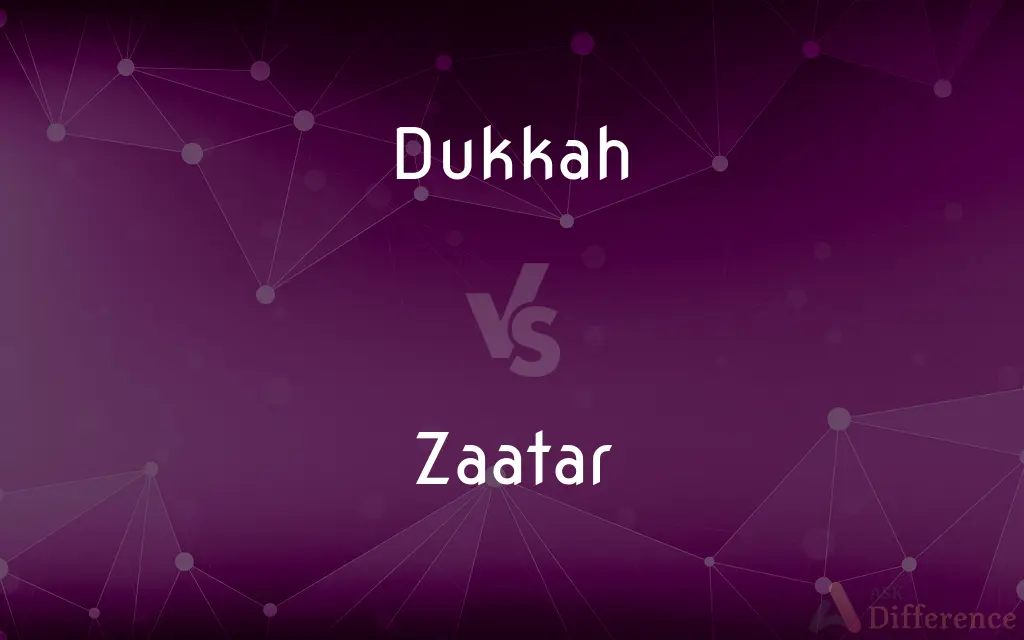Dukkah vs. Zaatar — What's the Difference?
By Maham Liaqat & Fiza Rafique — Updated on April 7, 2024
Dukkah is an Egyptian spice blend with nuts and seeds, while Zaatar combines Middle Eastern herbs with sumac and sesame.

Difference Between Dukkah and Zaatar
Table of Contents
ADVERTISEMENT
Key Differences
Dukkah is a traditional Egyptian condiment consisting of a mixture of herbs, nuts (commonly hazelnuts or pistachios), and spices that is typically used as a dip with bread or fresh vegetables. On the other hand, Zaatar is a Middle Eastern spice blend that includes dried herbs like thyme and oregano, sumac, sesame seeds, and sometimes salt. Both offer unique flavors and are used to enhance various dishes, but their compositions and origins differ significantly.
While Dukkah's composition can vary greatly depending on the recipe, it usually includes coriander, cumin, sesame seeds, and nuts, which are coarsely ground together. This gives Dukkah a distinctive texture and nutty flavor profile. Whereas Zaatar, with its inclusion of sumac, has a tangy, lemony flavor that complements its herbal base, creating a blend that is both aromatic and savory.
Dukkah is often served as a dry dip, with bread first dipped in olive oil and then into the spice mix, making it a popular appetizer or snack in Egyptian cuisine. In contrast, Zaatar is used more broadly across Middle Eastern cuisines as a seasoning for meats, vegetables, and breads, or mixed with olive oil to create a spread for flatbreads.
The use of nuts in Dukkah not only adds to its flavor but also to its texture, making it a crunchy addition to salads, soups, or even pasta. Zaatar, lacking in nuts, relies on the flavors of its herbs and spices to complement dishes, and its versatility extends to being a topping on yogurt or cheese.
Despite their differences, both Dukkah and Zaatar share the trait of being highly customizable spice blends. Chefs and home cooks alike adjust the ingredients to suit their tastes or to highlight local flavors, making each blend unique to its creator.
ADVERTISEMENT
Comparison Chart
Origin
Egypt
Middle East
Base Ingredients
Nuts, seeds, and spices
Dried herbs, sumac, and sesame
Flavor Profile
Nutty, earthy
Tangy, herby
Common Uses
Dip for bread and vegetables
Seasoning for meats and breads
Texture
Coarse and crunchy
Fine and powdery
Variability
High, varies by recipe
Moderate, with regional variations
Primary Feature
Nut content for texture and taste
Sumac for tanginess
Compare with Definitions
Dukkah
Nut and spice blend.
Dukkah combines hazelnuts with coriander and cumin for a unique flavor.
Zaatar
Herb and sesame mixture.
Thyme, oregano, and sesame seeds define Zaatar's distinct taste.
Dukkah
Texture-focused.
The coarse texture of Dukkah enriches the sensory experience of dishes.
Zaatar
Middle Eastern blend.
Zaatar's usage spans across the Middle East, cherished for its aromatic flavor.
Dukkah
Versatile condiment.
Often used as a topping, Dukkah adds crunch to soups and salads.
Zaatar
Flavor enhancer.
The tanginess of sumac in Zaatar adds a lemony zest to dishes.
Dukkah
Egyptian origin.
Dukkah, originating from Egypt, is a staple in its culinary tradition.
Zaatar
Broad application.
Zaatar is versatile, enhancing everything from meats to breads.
Dukkah
Cultural significance.
Dukkah's popularity in Egyptian cuisine showcases its cultural heritage.
Zaatar
Regional variations.
Zaatar recipes vary by region, reflecting local tastes and traditions.
Dukkah
An Egyptian dry mixture of chopped nuts, seeds and Middle Eastern spices, usually eaten by dipping bread into olive oil and then into the mixture.
Zaatar
A Middle Eastern mixture of herbs and spices typically containing thyme and marjoram or oregano along with sumac, sesame seeds, salt, and other ingredients.
Zaatar
A particular herb, similar in flavor to thyme or oregano, used in Arab and Israeli cuisine, made from various Middle Eastern herbs.
Zaatar
A Middle Eastern seasoning, having the herb as the main ingredient, with sumac (or other tart-flavored equivalent) and sesame seeds.
Common Curiosities
What distinguishes Dukkah from Zaatar?
Dukkah is a nutty Egyptian blend, while Zaatar is a herby Middle Eastern mix.
Can Dukkah and Zaatar be used interchangeably?
Due to distinct flavors and textures, they are best used in their specific culinary contexts.
Are there regional variations of Dukkah and Zaatar?
Yes, both blends have variations that reflect local ingredients and tastes.
Is Dukkah vegan?
Yes, Dukkah is typically vegan, but it's always good to check specific recipes.
How can I make my own Zaatar blend?
Mix dried thyme, oregano, sumac, sesame seeds, and salt to taste.
What makes Zaatar unique?
Zaatar's uniqueness comes from sumac, adding a tangy flavor.
How is Dukkah traditionally served?
Traditionally, Dukkah is served as a dip with bread and olive oil.
What are common uses for Zaatar?
Zaatar is commonly used as a seasoning for meats, vegetables, and breads.
How does the texture of Dukkah enhance dishes?
Dukkah's coarse, crunchy texture adds a delightful contrast to smooth dishes like soups.
What is the base of Dukkah?
Dukkah's base consists of nuts, seeds, and spices.
What is the nutritional value of Zaatar?
Zaatar is low in calories and may offer health benefits due to its herbs and spices.
Is Dukkah gluten-free?
Generally, yes, but it's important to ensure no gluten-containing ingredients are used.
Can the recipes for Dukkah and Zaatar be modified?
Yes, both are highly customizable according to personal taste.
Why is sumac important in Zaatar?
Sumac provides a tangy, lemony flavor that is signature to Zaatar.
What is the best way to store Dukkah and Zaatar?
Store in airtight containers in a cool, dark place to maintain freshness.
Share Your Discovery

Previous Comparison
Capitalism vs. Consumerism
Next Comparison
Groan vs. SighAuthor Spotlight
Written by
Maham LiaqatCo-written by
Fiza RafiqueFiza Rafique is a skilled content writer at AskDifference.com, where she meticulously refines and enhances written pieces. Drawing from her vast editorial expertise, Fiza ensures clarity, accuracy, and precision in every article. Passionate about language, she continually seeks to elevate the quality of content for readers worldwide.














































